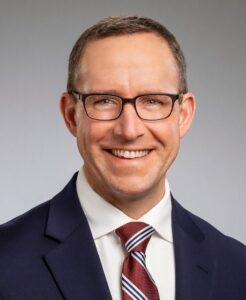 2 min read February 2022 — In a conversation with Invest:, CEO James Demetriades of Penn Medicine Princeton Health stated his belief in the strong medical staff and clinical leadership at the organization. He discussed how the pandemic has impacted the direction of the organization, the shifts in its five-year plan and key priorities, while also detailing how it has supported the local community.
2 min read February 2022 — In a conversation with Invest:, CEO James Demetriades of Penn Medicine Princeton Health stated his belief in the strong medical staff and clinical leadership at the organization. He discussed how the pandemic has impacted the direction of the organization, the shifts in its five-year plan and key priorities, while also detailing how it has supported the local community.
How has COVID impacted the direction of your organization?
I view COVID as an aspect of our daily lives that will continue. We took a thoughtful approach in planning how to care for our COVID patients and, certainly, maintain the safety of our staff and other patients during the first waves of the virus. We’ve done that exceedingly well with each new variant that has surfaced.
One of our major success stories revolves around telehealth. From the side of primary and specialty care, we quickly pivoted from a largely in-person care model. Telehealth will continue to be a part of our business for the near and far future. It is an aspect of our multichannel primary care offering at Princeton.
We’ve also successfully incorporated telehealth and behavioral health into our operations. We’re a large provider of behavioral health in the state of New Jersey. Princeton House Behavioral Health has 119 beds on the inpatient side. Telehealth for the behavioral health population has become mainstream. We’re nearing 200,000 behavioral health visits for outpatient care in less than two years. With the clinical indicators associated with this patient population, it’s a valuable tool in helping us care for outpatient behavioral health patients.
How has the pandemic altered your five-year plan and what are your key priorities?
The biggest change to our five-year plan revolves around diversifying our programs and services geographically. Our primary focus has been on our campus and our primary service area, but the likelihood of patients traveling for their healthcare needs has decreased. We now want to place a large emphasis on geographic diversification in our secondary and tertiary service areas. Therefore, another aspect that has changed is diversifying our services at the hospital to raise the acuity of the level of services and patients we take care of. This will require a significant investment in physician recruitment, physical plant, and real estate development.
We’re going to make major investments in the field of cancer, which will include a brick-and-mortar investment. We will also bring cutting-edge treatment protocols and clinical research to New Jersey. Patients now have limited options, between the Cancer Institute of New Jersey or a migration to New York and Philadelphia for cutting-edge cancer treatment. We’re excited to invest heavily in this. Overall, specialty recruitment will be key for us to continue advancing our mission and best meet the needs of the community.
Technology is another focus. We have positioned ourselves around connected medicine to help patients manage their care outside of the hospital through a technology platform. It’s helped us to drive patient experience, reduce readmissions and improved compliance with patients’ post-hospital routine. It has created value for our patients as they aren’t returning to the hospital. I don’t believe technology will replace hands-on care in the near term, but we will use assistive technology to alleviate the burden of monotonous tasks.
What solutions are you exploring to mitigate workforce challenges?
We have a limited ability to control prices as Medicare is a fixed fee. I believe it’s logical to believe that some of our federal reimbursements tied to federal programs will adjust to meet the increased cost associated with delivering care. I’m unsure about how long that will take. I believe supply and demand in terms of salaries for nurses will experience an uptick as demand for talent increases. Locally, we have a nursing school as well as a College of Health Sciences in partnership with our Lancaster General Health Hospital. We’re working to increase capacity within our own training programs while also working around the state to be an institution that remains an option for its trainees.
With baby boomers approaching retirement age, there will be a national shortage of physicians to fill the positions that will open up. Nurse practitioners, physician assistants and more will become increasingly important in the near future.
What are the major health concerns in the region and how are you supporting the community?
We’re placing a great focus on social determinants of health in our region, including targeting populations that have identifiable conditions, such as diabetes and heart disease. We want to work on it from a population health perspective, so these communities receive preventative care and primary medicine versus care at the hospital. Moreover, we have populations with food insecurities and housing issues, which are two areas we have shifted our focus to. We’re fortunate that many in this region have strong access to care, but we have sought to improve that by transitioning our clinic to a Federally Qualified Health Center, which launched on our campus in 2021.
For more information, visit:
